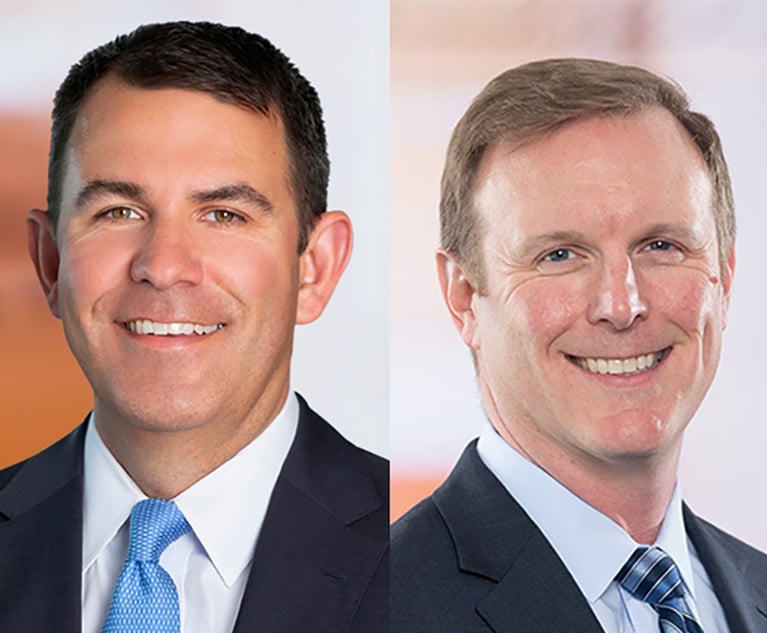Law Firms 'Doing Terribly' At Protecting Client Data
Tech-services group Logicforce gave law firms a collective 42 percent grade on industry cybersecurity health in a recent report.
October 26, 2017 at 09:29 AM
7 minute read

Any law firm that has filled out an RFP in recent years knows clients are increasingly asking about the firms' information technology security and how client data is being protected. But firms and clients alike say outside counsel aren't doing nearly enough to meet basic cybersecurity expectations.
Law firm technology services group LogicForce recently released their quarterly report card on law firm cybersecurity, giving the legal industry a score of only 42 percent on their cybersecurity health.
The most recent scorecard aggregated data from client surveys at more than 300 law firms of various sizes. Scores were generated based on the number of firms who reported implementing 12 different factors set forth by LogicForce: information security executives, cybersecurity policies, multifactor authentication, cyber training, cyber insurance, penetration, vulnerability testing, third-party risk assessments, records management policies, cyber investment, full disk encryption, data loss prevention services, and third-party penetration testing. Each factor was weighted differently.
The scorecard's most heavily weighted factor was the presence of an information security executive, a position filled at only 38 percent of surveyed law firms.
John Sweeney, president of LogicForce, came down hard on law firms, advising them to step up their investment in many of the areas identified by the report.
“One of the things I hope more than anything is that law firms realize that this 42 percent score we have simply means that law firms are doing terribly. That number should be 100 percent. Every law firm should be able to check off the box and say 'we are doing 100 percent of those standards,'” Sweeney said.
Sweeney said he has yet to see even one law firm who could meet all the standards set forth in the company's scorecard.
The report also noted that corporate law firm clients are beginning to crack down harder on their outside counsel for their failure to meet cybersecurity standards. The report found that 48 percent of law firms surveyed had their data security practices subjected to an audit by a corporate client in the last year.
“It became very apparent to us that law firms recognize the importance of it, but are not attacking it with the vigilance that their corporate clients expect them to,” Sweeney said, adding that while cybersecurity has historically been a concern for heavily regulated industries, corporations across industries are now beginning to push for outside counsel to implement cybersecurity standards.
Sweeney said that corporate audits of law firm technology are on the upswing. “We're seeing this dramatic increase over the last six months. We are actually being called by corporations to audit law firms for them,” Sweeney said.
To be fair, law firms have shown a fair amount of growth in just this year alone. LogicForce's scorecard for the first quarter of the year gave law firms only a 30 percent score on their industry compliance with cybersecurity best practices. According to the two reports, penetration and vulnerability testing spiked from 18 to 42 percent, full disk encryption bumped from 25 to 38 percent, and training went up from 22 to 32 percent over the course of the year.
Ultimately, Sweeney said that firms will have to consider the financial risks of failing to invest more heavily in their cybersecurity infrastructure. “This is a business decision that they have to realize. Law firms are in the data management business,” he said.
“What we found online in the standards for law firms, if they did those things in the long run, that would make the best financial sense for them, and quite frankly for their clients as well,” Sweeney added.

Any law firm that has filled out an RFP in recent years knows clients are increasingly asking about the firms' information technology security and how client data is being protected. But firms and clients alike say outside counsel aren't doing nearly enough to meet basic cybersecurity expectations.
Law firm technology services group LogicForce recently released their quarterly report card on law firm cybersecurity, giving the legal industry a score of only 42 percent on their cybersecurity health.
The most recent scorecard aggregated data from client surveys at more than 300 law firms of various sizes. Scores were generated based on the number of firms who reported implementing 12 different factors set forth by LogicForce: information security executives, cybersecurity policies, multifactor authentication, cyber training, cyber insurance, penetration, vulnerability testing, third-party risk assessments, records management policies, cyber investment, full disk encryption, data loss prevention services, and third-party penetration testing. Each factor was weighted differently.
The scorecard's most heavily weighted factor was the presence of an information security executive, a position filled at only 38 percent of surveyed law firms.
John Sweeney, president of LogicForce, came down hard on law firms, advising them to step up their investment in many of the areas identified by the report.
“One of the things I hope more than anything is that law firms realize that this 42 percent score we have simply means that law firms are doing terribly. That number should be 100 percent. Every law firm should be able to check off the box and say 'we are doing 100 percent of those standards,'” Sweeney said.
Sweeney said he has yet to see even one law firm who could meet all the standards set forth in the company's scorecard.
The report also noted that corporate law firm clients are beginning to crack down harder on their outside counsel for their failure to meet cybersecurity standards. The report found that 48 percent of law firms surveyed had their data security practices subjected to an audit by a corporate client in the last year.
“It became very apparent to us that law firms recognize the importance of it, but are not attacking it with the vigilance that their corporate clients expect them to,” Sweeney said, adding that while cybersecurity has historically been a concern for heavily regulated industries, corporations across industries are now beginning to push for outside counsel to implement cybersecurity standards.
Sweeney said that corporate audits of law firm technology are on the upswing. “We're seeing this dramatic increase over the last six months. We are actually being called by corporations to audit law firms for them,” Sweeney said.
To be fair, law firms have shown a fair amount of growth in just this year alone. LogicForce's scorecard for the first quarter of the year gave law firms only a 30 percent score on their industry compliance with cybersecurity best practices. According to the two reports, penetration and vulnerability testing spiked from 18 to 42 percent, full disk encryption bumped from 25 to 38 percent, and training went up from 22 to 32 percent over the course of the year.
Ultimately, Sweeney said that firms will have to consider the financial risks of failing to invest more heavily in their cybersecurity infrastructure. “This is a business decision that they have to realize. Law firms are in the data management business,” he said.
“What we found online in the standards for law firms, if they did those things in the long run, that would make the best financial sense for them, and quite frankly for their clients as well,” Sweeney added.
This content has been archived. It is available through our partners, LexisNexis® and Bloomberg Law.
To view this content, please continue to their sites.
Not a Lexis Subscriber?
Subscribe Now
Not a Bloomberg Law Subscriber?
Subscribe Now
NOT FOR REPRINT
© 2025 ALM Global, LLC, All Rights Reserved. Request academic re-use from www.copyright.com. All other uses, submit a request to [email protected]. For more information visit Asset & Logo Licensing.
You Might Like
View All
Mintz Hires Manatt's Data Privacy Leader, 2 Colleagues in Boston Expansion

DLA Piper Adds AI, Data Analytics Practice with Ex-Faegre Drinker Team

Gibson Dunn Adds Apple Chief Privacy Officer as Big Tech Faces 'Novel, Unprecedented' Data Use Restrictions

Akerman Debuts Data Center and Digital Infrastructure Practice With Bryan Cave Leighton Paisner Laterals
Trending Stories
- 1We the People?
- 2New York-Based Skadden Team Joins White & Case Group in Mexico City for Citigroup Demerger
- 3No Two Wildfires Alike: Lawyers Take Different Legal Strategies in California
- 4Poop-Themed Dog Toy OK as Parody, but Still Tarnished Jack Daniel’s Brand, Court Says
- 5Meet the New President of NY's Association of Trial Court Jurists
Who Got The Work
J. Brugh Lower of Gibbons has entered an appearance for industrial equipment supplier Devco Corporation in a pending trademark infringement lawsuit. The suit, accusing the defendant of selling knock-off Graco products, was filed Dec. 18 in New Jersey District Court by Rivkin Radler on behalf of Graco Inc. and Graco Minnesota. The case, assigned to U.S. District Judge Zahid N. Quraishi, is 3:24-cv-11294, Graco Inc. et al v. Devco Corporation.
Who Got The Work
Rebecca Maller-Stein and Kent A. Yalowitz of Arnold & Porter Kaye Scholer have entered their appearances for Hanaco Venture Capital and its executives, Lior Prosor and David Frankel, in a pending securities lawsuit. The action, filed on Dec. 24 in New York Southern District Court by Zell, Aron & Co. on behalf of Goldeneye Advisors, accuses the defendants of negligently and fraudulently managing the plaintiff's $1 million investment. The case, assigned to U.S. District Judge Vernon S. Broderick, is 1:24-cv-09918, Goldeneye Advisors, LLC v. Hanaco Venture Capital, Ltd. et al.
Who Got The Work
Attorneys from A&O Shearman has stepped in as defense counsel for Toronto-Dominion Bank and other defendants in a pending securities class action. The suit, filed Dec. 11 in New York Southern District Court by Bleichmar Fonti & Auld, accuses the defendants of concealing the bank's 'pervasive' deficiencies in regards to its compliance with the Bank Secrecy Act and the quality of its anti-money laundering controls. The case, assigned to U.S. District Judge Arun Subramanian, is 1:24-cv-09445, Gonzalez v. The Toronto-Dominion Bank et al.
Who Got The Work
Crown Castle International, a Pennsylvania company providing shared communications infrastructure, has turned to Luke D. Wolf of Gordon Rees Scully Mansukhani to fend off a pending breach-of-contract lawsuit. The court action, filed Nov. 25 in Michigan Eastern District Court by Hooper Hathaway PC on behalf of The Town Residences LLC, accuses Crown Castle of failing to transfer approximately $30,000 in utility payments from T-Mobile in breach of a roof-top lease and assignment agreement. The case, assigned to U.S. District Judge Susan K. Declercq, is 2:24-cv-13131, The Town Residences LLC v. T-Mobile US, Inc. et al.
Who Got The Work
Wilfred P. Coronato and Daniel M. Schwartz of McCarter & English have stepped in as defense counsel to Electrolux Home Products Inc. in a pending product liability lawsuit. The court action, filed Nov. 26 in New York Eastern District Court by Poulos Lopiccolo PC and Nagel Rice LLP on behalf of David Stern, alleges that the defendant's refrigerators’ drawers and shelving repeatedly break and fall apart within months after purchase. The case, assigned to U.S. District Judge Joan M. Azrack, is 2:24-cv-08204, Stern v. Electrolux Home Products, Inc.
Featured Firms
Law Offices of Gary Martin Hays & Associates, P.C.
(470) 294-1674
Law Offices of Mark E. Salomone
(857) 444-6468
Smith & Hassler
(713) 739-1250










